|
|
【中文标题】美国与中国:第三章,世界对中国的态度
【原文标题】Chapter 3. Attitudes toward China
【登载媒体】皮尤调查
【原文链接】http://www.pewglobal.org/2013/07/18/united-states-and-china-the-image-of-the-globes-two-superpowers/
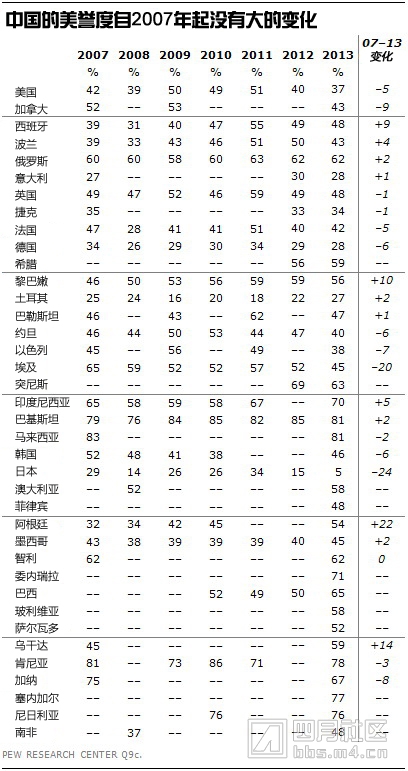
除了中国本身,参与调查的19个国家对中国有好感。北京最强有力的支持者来自亚洲——马来西亚(81%)、巴基斯坦(81%)——和非洲国家肯尼亚(78%)、塞内加尔(77%)、尼日利亚(76%)。
拉丁美洲国家也对中国怀有较高的好感度,他们已经成为北京最大的商品出口地,比如委内瑞拉(71%)、巴西(65%)和智利(62%)。但不是所有国家都喜欢人民共和国,只有28%的德国人和意大利人,以及37%的美国人对中国有好感。但是哪里都比不上日本对中国的厌恶程度,只有5%的日本人说他们喜欢中国。
与2007年的数据相比,世界对中国的态度没有太多的变化。最大的改变来源于阿根廷,上升了22个百分点,乌干达也上升了14个百分点。最大的退步是在日本和埃及,与6年前相比,他们对中国的好感度分别下降了24和20个百分点。
但是在欧洲、美国和部分中东地区,这6年期间的趋势线在2011年达到最高峰之后有明显的下降。在过去两年中,美国对中国的好感度下降了14个百分点,英国下降了11个百分点,法国下降了9个百分点。这或许是因为他们对中国商业竞争力的恐惧,和中国人在外交政策上单方面的行动,以及美国对美中贸易赤字和北京手中巨额国债的担心。在此期间,对中国好感度下降的还有巴勒斯坦(15个百分点)、埃及(12个百分点)和以色列(11个百分点),中国在国际事务上的单方面行动或许是主要原因。
尽管如此,反华情绪并不普遍。2013年,只有11个国家的大部分受访者不喜欢中国。最强烈的反华情绪来自日本,93%的受访者对人民共和国有负面印象,其中48%非常不喜欢中国。德国(64%)、意大利(62%)和以色列(60%)也有大部分人不喜欢中国。德国反华情绪的高涨令人颇为意外。2006年,只有33%的德国人不喜欢中国,到2013年,持负面印象的人增加了31个百分点,虽然德国在此期间保持对中国的高额出口。
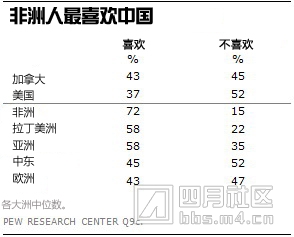
全球各个地区对中国的态度差异显著。北美、欧洲和中东地区不到一半的受访者喜欢中国,而72%的非洲人和58%的亚洲、拉丁美洲人喜欢中国。
部分国家的朋友,少数国家的敌人
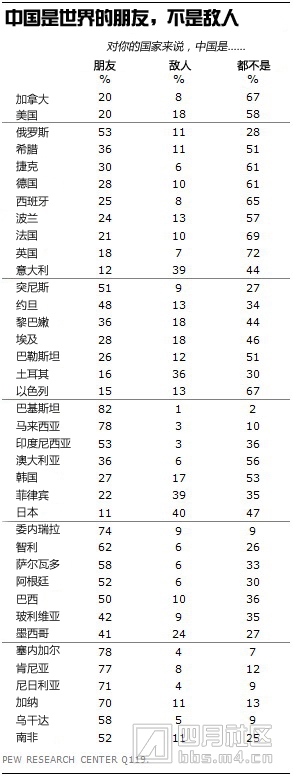
16个国家中超过一半的受访者说中国是他们的朋友,而不是敌人。这一点在巴基斯坦(82%的人把中国当作朋友)得到了最好的印证,伊斯兰堡在过去几年得到了中国大笔的财政援助。马来西亚人(78%)也认为中国是朋友。
很多非洲国家,包括塞内加尔(78%)、肯尼亚(77%)、尼日利亚(71%)和加纳(70%),都坚定地把中国当作朋友。中国是加纳和肯尼亚的第二大贸易伙伴,是尼日利亚和塞内加尔的第四大和第五大贸易伙伴。同样的情况也出现在向中国出口大量石油的委内瑞拉(74%),和向中国出口铜矿的智利(62%)。
15个国家的大部分受访者既不认为中国是朋友,也不认为中国是敌人,这其中包括美国(58%)。只有4个国家——日本(40%)、菲律宾(39%)、意大利(39%)和土耳其(36%)——的大多数受访者认为中国是他们国家的敌人。
中国的软实力:有限
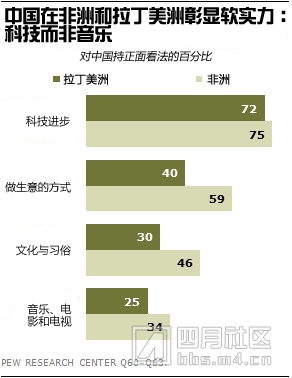
有迹象显示中国的国际影响力被广泛尊重,至少在某些软实力方面是这样,尤其是在非洲和年轻人群中。但是,也有很多受访者没有对此发表意见。
科技进步为中国在非洲(75%)和拉丁美洲(72%)赢得了良好的声誉。在其它方面,非洲人要比拉丁美洲人对中国的软实力有更强的好感。非洲人(59%)尤其喜欢中国人做生意的方式。
但是中国和习俗、思想和文化产品,比如音乐、电影和电视,在非洲和拉丁美洲缺乏吸引力。
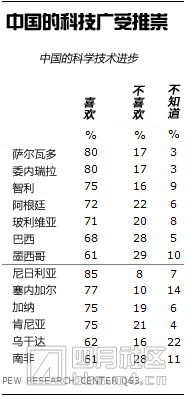
科学与技术是中国最受欢迎的软实力,参与调查的大部分拉丁美洲和非洲国家都对中国这方面的影响力给予了正面的评价。85%的尼日利亚人和80%的萨尔瓦多人、委内瑞拉人比较推崇中国的科技进步,77%的塞内加尔人和75%的加纳人、肯尼亚人、智利人也持此观点。
全球民众对中国科技成就的推崇有几个原因。一方面是赞赏中国公司品牌推广的长足进步,比如联想电脑和华为手机,另一方面是人们了解到笔记本电脑和平板电脑的很多零部件都来自中国,以及人们逐渐开始尊重那些中国制造的日常生活用品,比如冰箱和微波炉。
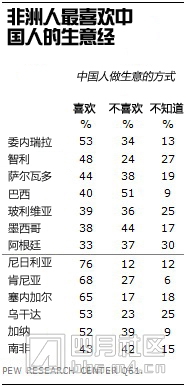
或许是因为欣赏中国强劲的经济走势,或许是因为中国逐渐成为国际贸易和投资的主要力量,也或许是因为其它原因,中国人做生意的方式对非洲人尤其有吸引力。5个非洲国家中大部分受访者都赞赏中过的商业行为,这其中包括76%的尼日利亚人、68%的肯尼亚人和65%的塞内加尔人。只有南非人对中国的商业行为两极分化,43%喜欢,42%不喜欢。
拉丁美洲人对此事的看法并不统一,大部分人都对中国人做生意的方式没有明确的意见。只有委内瑞拉(53%)超过一半的受访者喜欢中国人的生意经,这或许是因为中国紧随美国之后,是委内瑞拉第二大出口市场。智利人对中国人生意经的好恶比是二比一(48%和24%),或许因为中国现在是智利的主要贸易伙伴,消费了四分之一的智利出口商品。但是这种紧密的商业合作关系也有利有弊,中国是巴西最大的贸易伙伴,但有一半的巴西人(51%)不喜欢中国做生意的方式。
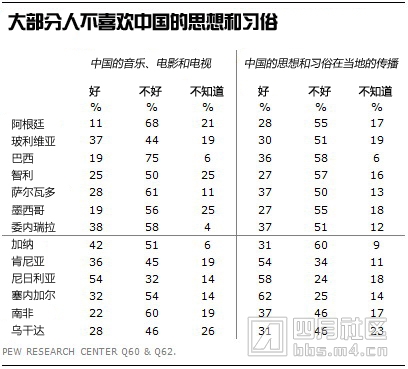
中国的流行文化没有得到大部分非洲人和拉丁美洲人的喜欢,部分原因在于7个参与调查的国家中很多受访者都没有发表意见。在有明确表达意见的国家中,6个国家不喜欢中国的音乐、电影和电视,包括巴西(75%)、阿根廷(68%)、萨尔瓦多(61%)和南非。只有大部分尼日利亚人(54%)喜欢中国的文化产品出口。
非洲和拉丁美洲只有三个国家超过一半的受访者认为中国的思想和习俗在本国的传播是件好事——塞内加尔(62%)、尼日利亚(58%)和肯尼亚(54%)。所有拉丁美洲国家和一个非洲国家都认为中国的文化影响力不是好事,包括加纳(60%)、巴西(58%)和智利(57%)。
中国对年轻人的吸引力
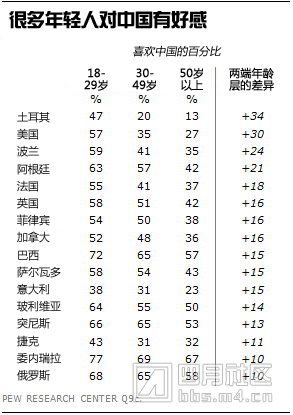
中国最有潜力的武器或许是它对全世界年轻人强大的吸引力。
16个参与调查的国家中,年轻人对中国的喜爱程度显著高过老年人,北美、6个欧洲国家和7个拉丁美洲国家呈现出这样的态势。
土耳其对中国有好感的年轻人是老年人的三倍,美国对中国有好感的年轻人是老年人的两倍。18岁到29岁的美国人群中有57%喜欢中国,50岁以上的人群只有27%波兰的这两个数字是59%和35%,阿根廷是63%和42%,法国是55%和37%,英国是58%和42%。只有韩国呈现出相反的模式,18岁到29岁的韩国人群中有58%不喜欢他们的邻居,50岁以上的人群中有42%不喜欢中国。
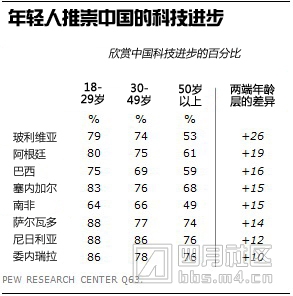
中国的某些软实力似乎对年轻人有特别的吸引力。在很多非洲和拉丁美洲国家,欣赏中国科技实力的主要是18岁到29岁的年轻人。尼日利亚、萨尔瓦多、委内瑞拉、塞内加尔和阿根廷八成以上的年轻人都认为科技力量是中国软实力的核心。不同年龄层之间最大的差异在玻利维亚(26个百分点),阿根廷(19个百分点)和巴西(16个百分点)的差异也不小。
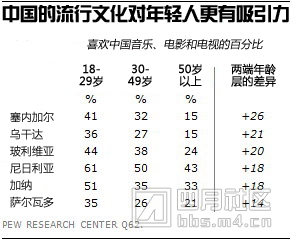
中国的流行文化也得到了很多年轻人的欢迎。至少在一些国家里,喜欢中国软实力的年轻人比老年人多出许多。在尼日利亚(61%)和加纳(51%)的18岁到29岁人群中,超过一半的受访者喜欢中国的音乐、电影和电视,玻利维亚(44%)和塞内加尔(41%)持此观点的人也为数不少。
而且,塞内加尔(64%)、肯尼亚(63%)和尼日利亚(62%)的年轻人大力支持中国思想和习俗的传播。
批评的声音
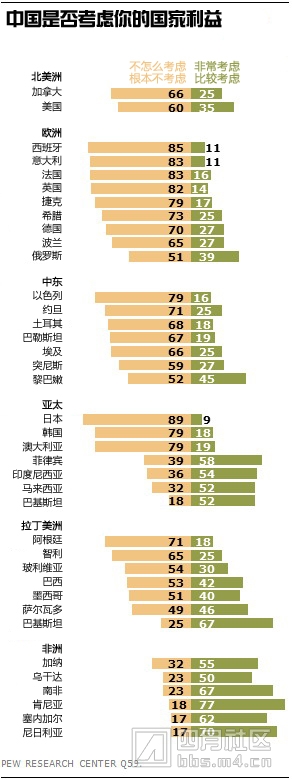
尽管中国总体上受世界的欢迎,而且尤其对年轻人有吸引力,但是26个国家半数以上的受访者认为中国在国际事务上喜欢采取单方面行动。这种认为北京不考虑其它国家利益的想法在亚太和欧洲尤其明显——日本(89%)、韩国(79%)、澳大利亚(79%)、西班牙(85%)、意大利(83%)、法国(83%)和英国(82%)。7个参与调查的中东国家中半数以上的受访者也认为中国喜欢采取单方面行动,这其中包括79%的以色列人、71%的约旦人和68%的土耳其人。美国人对此的顾虑相对小一些(60%)。非洲国家——尤其是肯尼亚(77%)、尼日利亚(70%)、南非(67%)和塞内加尔(62%)——则认为北京在外交政策方面会考虑他们国家的利益。
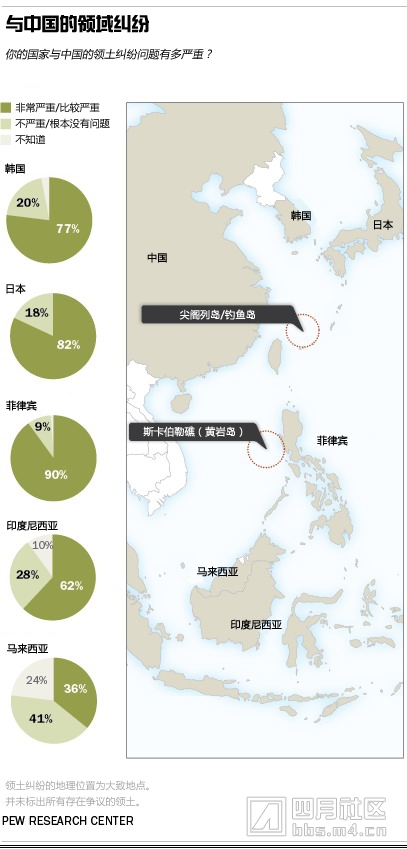
中国与其近邻的另外一个关系紧张的因素来自亚洲太平洋地区一系列的领土纠纷,最主要的是中国与日本在东京所谓的尖阁列岛和中国所谓的钓鱼岛问题上的冲突,这是中国东海一片不适宜居住的礁石。还有,菲律宾和中国也在南中国海的斯卡伯勒礁(译者注:黄岩岛)对峙。
菲律宾(90%)、日本(82%)、韩国(77%)和印度尼西亚(62%)的大部分受访者都认为与中国的领土纠纷对他们国家来说是一个大问题。尤其是在菲律宾,58%的菲律宾人说与中国的摩擦是非常严重的问题。
另外一个因素是,中国在亚太区的近邻对于北京军事力量的扩张深感忧虑。几乎所有的日本人(96%)、韩国人(91%)和大部分的澳大利亚人(71%)、菲律宾人(68%)都认为中国军事力量的扩张对他们国家来说是件坏事。巴基斯坦(2%)、马来西亚(20%)和印度尼西亚(39%)对此并不怎么担心。然而值得注意的是,认为中国军事力量增长对他们国家来说是件好事的巴基斯坦人、马来西亚人和印度尼西亚人相比与过去几年的调查结果有所下降。
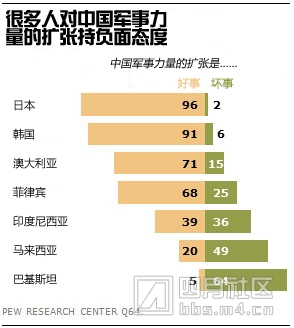
这些因素或许可以解释为什么中国人在担心他们的国际形象。当被问到他们的国家在世界上是否得到了应有的尊重,56%的中国人说他们的国家应当得到更多尊重。
原文:
China is viewed favorably in just half (19 of 38) of the nations surveyed excluding China itself. Beijing’s strongest supporters are in Asia – in Malaysia (81%) and Pakistan (81%) – and in the African nations of Kenya (78%), Senegal (77%) and Nigeria (76%).
There is also a high positive opinion of China in Latin American nations that have become large commodity exporters to Beijing, such as Venezuela (71%), Brazil (65%) and Chile (62%). This favorable opinion toward the People’s Republic is not shared everywhere, however. Only 28% of Germans and Italians and 37% of Americans hold a favorable view of China. But it is in Japan where, more than anywhere else, antipathy toward China is striking. Just 5% of Japanese have a favorable opinion of China.
There has not been much change in views of China in most nations for which comparable 2007 survey data exist. The greatest improvements in China’s image have been in Argentina, up 22 percentage points, and Uganda, up 14 points. The most significant deterioration in attitudes toward China has occurred in Japan, down 24 points, and Egypt, down 20 points over the past six years.
But in much of Europe and the United States, as well as parts of the Middle East, this six-year trend line masks a significant reversal of opinion since the peak of pro-China sentiment in those countries in 2011. In just the past two years, favorability toward China has fallen 14 percentage points in the United States, 11 points in Britain and 9 points in France. This is likely the result of unease about China as a commercial competitor, European frustration with Chinese unilateralism in foreign affairs, and American concern about the U.S. trade deficit with China and Beijing’s holding of American debt. Over that same period, favorability of China is down 15 points in the Palestinian territories, 12 points in Egypt and 11 points in Israel, where frustration with Chinese unilateralism in international affairs may have a particularly corrosive effect.
Nevertheless, outright anti-China sentiment is limited. In 2013, in just 11 of the 38 nations surveyed is China actually viewed unfavorably by at least half of those surveyed. The strongest anti-China sentiment is in Japan, where 93% see the People’s Republic in a negative light, including 48% of Japanese who have a very unfavorable view of China. There are also large majorities in Germany (64%), Italy (62%) and Israel (60%) who hold negative views of China. The rise in anti-China sentiment in Germany is particularly striking. In 2006, only 33% of Germans had an unfavorable view of China. Since then, negative sentiments have risen 31 percentage points. And such unfavorable views exist despite Germany’s success exporting to China.
Attitudes toward China also vary markedly by region of the world. A median of less than half of those surveyed in North America, Europe and the Middle East has a positive view of China. At the same time, a median of 72% in Africa and 58% in Asia and Latin America look favorably on China.
A Partner to Some, an Enemy to Few
Half or more of those surveyed in 16 of 38 nations see China as more of a partner for their country than as an enemy. This is particularly the case in Pakistan (where 82% view China as a partner). Islamabad has been the recipient of a great deal of Chinese financial assistance over the years. In addition, Malaysians (78%) view China as a partner.
Publics in a number of African nations – including Senegal (78%), Kenya (77%), Nigeria (71%) and Ghana (70%) – are strongly of the view that China is a national partner. China is the second leading trading partner with Ghana and Kenya, the fourth leading trade partner with Nigeria and the fifth with Senegal. A similar sense of partnership exists in Venezuela (74%), which sells a great deal of oil to China, and Chile (62%), which sells Beijing copper.
A majority or plurality in 15 nations – including a majority in the United States (58%) – see China as neither a partner nor an enemy. And only in four nations – Japan (40%), the Philippines (39%), Italy (39%) and Turkey (36%) – does a significant minority view China as an enemy of their country.
China’s Soft Power: Limited
There is evidence that China’s global influence, at least as measured by some aspects of Chinese soft power, is respected, especially in Africa and among the young. In some cases, though, significant portions of those people surveyed voiced no opinion.
Chinese scientific and technological advances are the most widely appreciated aspect of China’s influence in both Africa (a median of 75% like such aspects of China) and Latin America (72%). On all other measures, Africans tend to have a more positive view toward Chinese soft power than Latin Americans. Africans (a median of 59%) are particularly appreciative of Chinese ways of doing business.
But the spread of Chinese ideas and customs and Chinese cultural products – such as music, movies and television – lack majority appeal in both Africa and Latin America.
Science and technology are China’s most popular soft power. Majorities in all African and Latin American countries surveyed have a positive view of these attributes of Chinese influence. Fully 85% of Nigerians and 80% of Salvadorans and Venezuelans admire China’s technological and scientific advances, as do 77% of Senegalese, and 75% of Ghanaians, Kenyans and Chileans.
There are several reasons why publics may admire Chinese scientific and technological success. It may be an appreciation of the great strides Chinese companies have made in branding products – such as Lenovo with computers and Huawei with mobile phones – or an understanding that many parts in laptops or tablets come from China or it may simply pick up a respect for more mundane made-in-China consumer products such as refrigerators and microwave ovens.
Perhaps in admiration of China’s record of strong economic growth, perhaps because China has become a major trade and investment partner, or perhaps for other reasons, the Chinese way of doing business is particularly attractive to people in Africa. More than half of those surveyed in five of six countries admire China’s business acumen. This includes 76% of Nigerians, 68% of Kenyans and 65% of Senegalese. Only South Africans are divided on Chinese business practices, with 43% liking them and 42% disliking them.
Perceptions are different in Latin America, however, where in a number of countries a high proportion of people voice no opinion about China’s way of doing business. Only in Venezuela (53%) does more than half the population admire Chinese business practices. This may be because China is Venezuela’s second-largest export market, exceeded only by the United States. And by two-to-one, Chileans (48% to 24%) like Chinese business operations, possibly reflecting the fact that China is now Chile’s main trading partner, buying nearly a quarter of Chile’s exports. But such close business ties can cut both ways. China is Brazil’s largest trading partner. Nevertheless, roughly half of Brazilians (51%) dislike China’s way of doing business.
Chinese pop culture is not well liked in much of either Africa or Latin America, in part because significant portions in seven of the 13 nations surveyed have no opinion. Of those who have a view, Chinese music, movies and television is disliked by majorities in six countries, including in Brazil (75%), Argentina (68%), El Salvador (61%) and South Africa (60%). Only in Nigeria (54%) do most people have an affinity for such Chinese exports.
In only three of the 13 countries surveyed in Africa and Latin America – in Senegal (62%), Nigeria (58%) and Kenya (54%) – do more than half think it is good that Chinese ideas and customs are spreading in their country. Half or more of those surveyed in eight nations – all countries surveyed in Latin America and one African country – think such Chinese influence is a bad thing, including in Ghana (60%), Brazil (58%) and Chile (57%).
China’s Appeal to Young Adults
China’s greatest global asset in the future may be its appeal among young adults around the world.
In 16 of the 38 nations surveyed, younger people are significantly more likely than older people to look favorably on China. This is true in North America, in six of the nine nations surveyed in Europe and five of the seven countries in Latin America.
More than three times as many young Turks as older Turks look favorably on China as do more than twice as many young Americans as older Americans. Fully 57% of those aged 18 to 29 in the United States have a positive opinion of China, compared with just 27% who hold such views among people aged 50 and older. In Poland the generational split is 59% to 35%, in Argentina 63% to 42%, in France 55% to 37%, and in Britain 58% to 42%. The pattern is reversed only in South Korea, where 58% of those aged 18 to 29 hold an unfavorable view of their neighbor, while 42% of people 50 years of age and older see China unfavorably.
Certain aspects of Chinese soft power seem to be particularly appealing to the young. In many African and Latin American nations, it is those aged 18 to 29 who most admire China’s scientific and technological prowess. Eight-in-ten or more young adults in Nigeria, El Salvador, Venezuela, Senegal and Argentina see such advances as a positive attribute of Chinese soft power. The generation gap is particularly large in Bolivia (26 percentage points), but also in Argentina (19 points) and Brazil (16 points).
Chinese pop culture fares better with the younger generation, as well. They are much more likely than older people, at least in some nations, to appreciate such Chinese soft power. Balance of Power20About half or more of those aged 18 to 29 in Nigeria (61%) and Ghana (51%) like Chinese music, movies and TV, as do large minorities of the young in Bolivia (44%) and Senegal (41%).
In addition, the spread of Chinese ideas and customs has majority strong only among the young in Senegal (64%), Kenya (63%) and Nigeria (62%).
Sources of Criticism
Despite China’s general favorability around the world and its appeal to the young, half or more of those surveyed in 26 of 38 nations think that China acts unilaterally in international affairs. This concern about Beijing’s failure to consider other countries’ interests when making foreign policy decisions is particularly strong in the Asia-Pacific – in Japan (89%), South Korea (79%) and Australia (79%) – and in Europe – in Spain (85%), Italy (83%), France (83%) and Britain (82%). About half or more of those in the seven Middle Eastern nations surveyed also think China acts unilaterally. This includes 79% of Israelis, 71% of Jordanians and 68% of Turks. There is relatively less concern about this issue in the U.S. (60%). African nations – in particular strong majorities in Kenya (77%), Nigeria (70%), South Africa (67%) and Senegal (62%) – believe Beijing does consider their interests when making foreign policy decisions.
Another source of recent tension in relations between China and its immediate neighbors has been a series of territorial disputes in the Asia/Pacific region. The most prominent of these is between Japan and China, which are engaged in a confrontation over what Tokyo calls the Senkaku Islands and Beijing terms the Diaoyu Islands, small uninhabited rocks in the East China Sea. In addition, the Philippines and China are embroiled in a standoff over the Scarborough Shoal in the South China Sea.
Strong majorities in the Philippines (90%), Japan (82%), South Korea (77%) and Indonesia (62%) think that such territorial disputes with China are a big problem for their country. This is particularly the case in the Philippines, where 58% of Filipinos say such friction with China is a very big problem.
Balance of Power18In a related issue, many of China’s Asian-Pacific neighbors are quite troubled by Beijing’s growing military power. Nearly all Japanese (96%) and South Koreans (91%) and strong majorities of Australians (71%) and Filipinos (68%) think China’s expanding martial capabilities are bad for their country. There is far less concern in Pakistan (2%), Malaysia (20%) and Indonesia (39%). It is notable, however, that the proportion of Pakistanis, Malaysians and Indonesians who think China’s growing military power is a positive thing for their country is actually down from previous surveys.
These sources of tension may help explain why the Chinese are worried about their image abroad. When asked if their country is as respected around the world as it should be or should China be more respected than it is, 56% of Chinese say their nation should be more respected.
|
评分
-
1
查看全部评分
-
|
